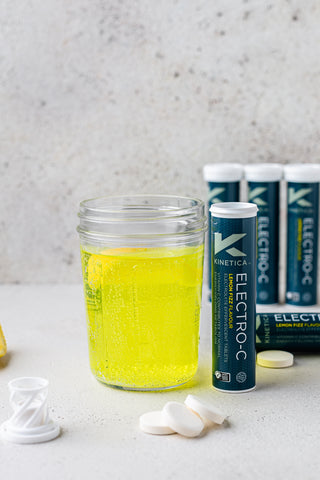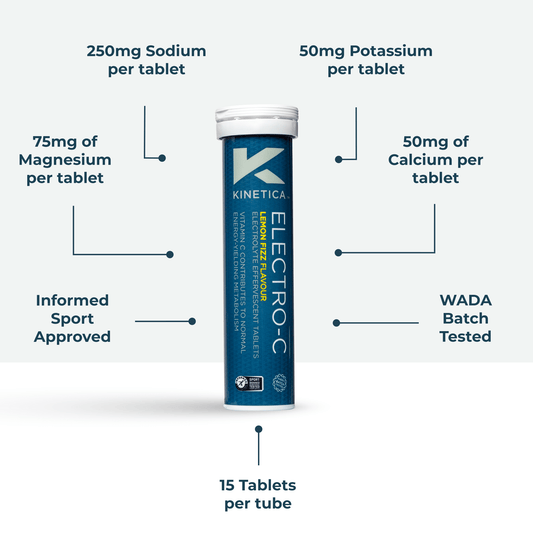What are Electrolytes and Why are they Essential?

Whether you’re competing abroad in warmer climates or on home turf during the summer months, maintaining hydration is key. Why? Well, hydration is important for a number of reasons, but let’s look at the critical ones; proper hydration supports cardiovascular function, helps regulate body temperature, improves performance, and is vital to your day to day, general good health.
So, how can you stay hydrated? One easy way is to incorporate electrolyte supplements into your diet. But what are electrolytes, and how can they help you? To learn more about these useful supplements, we’ll take you through how electrolytes can help you stay hydrated, especially by reintroducing essential minerals after exercise.
What is hydration?
But first, what is hydration? Put simply, hydration is when there is enough water within the body to meet its physiological demands – and that is why water is essential for life. Water is needed for the transportation of nutrients and oxygen via the blood to our muscles, and to remove waste products such as carbon dioxide from our tissues. It also has protective and cleansing functions, and is needed for metabolism for most chemical reactions in the body (1).
In fact, ~50-60% of our body weight is made up of water, hence why it is one of the most important nutrients for every human. So, for a 70kg male individual, this means that their body contains ~42 litres of water (2).
What is good hydration?
Good hydration therefore, is when there is adequate water available to support the transport of oxygen, glucose, sodium, and potassium to cells in the body. It is also important for maintaining health and performance, as hydration is essential for cardiovascular and thermoregulatory functions.
As we exercise, especially during hot and humid days, our heart rate increases and pumps additional blood to the muscles. Water is critical at this point as it makes up half of the blood, so it’s vital to maintaining your hydration levels, especially when you start to lose electrolytes and water through sweat (see more below).
But water is not the only nutrient we need to manage our hydration levels – we also need electrolytes…
What are electrolytes?
Electrolytes are essential minerals that are needed for normal body functions, such as the transport of oxygen, immune support, and maintaining cellular electrical neutrality (3). Some of the most important electrolytes include sodium, potassium, chloride, magnesium, calcium, and bicarbonate (3).
When you think of electrolytes, you probably go straight to sodium. This is one of the most commonly known electrolytes, (aside from potassium), and is the most abundant electrolyte lost in sweat. Maintaining your sodium levels is essential as, if this drops below 135 mmol/litre, it can cause hyponatremia. Hyponatremia typically manifests as headaches, confusion, nausea, and fainting, and is caused by a low sodium concentration in the blood (4).

Hydration vs dehydration?
As mentioned above, good hydration is important as it helps shuttle blood and oxygen to the working muscles during exercise. The delivery of blood is also needed for our brain, liver, and kidneys.
When we are dehydrated the opposite occurs. During heavy and intense training sessions, particularly during hot and humid conditions, we are more likely to experience dehydration which can impact performance, and severe dehydration can impact your overall health and wellbeing.
What causes dehydration?
Dehydration happens when you don’t have enough fluid in the body. Causes of dehydration include, but are not limited to:
- Excess sweating due to exercise, or high temperatures.
- Vomiting and/or diarrhoea.
- Frequent urination, which can be caused by certain medical conditions.
Dehydration can lead to headaches, nausea, impaired cognitive and physical function, poor memory, irritability and more (5). So, it’s absolutely vital to maintain your hydration levels – as we also lose electrolytes when we sweat, replenishing both our fluid and electrolyte levels by consuming an electrolyte supplement can support our ability to rehydrate more quickly.
However, if staying hydrated is so important to keeping healthy, you may be wondering why we sweat…
Why do we sweat?
Sweating, and the evaporation of it from the skin, is needed to regulate body temperature. When we exercise, our core body temperature rises. This increases blood flow to the skin and sweating is a natural way to cool the body down.
Our ability to sweat is heightened during intense exercise, especially in hot environments. In this instance, our core body temperature can rise sharply which can cause heat exhaustion, and we need to sweat to retain a safe body temperature. Losing water and electrolytes this way means our bodies naturally try to make up for what is missing, which is why you’ll often notice you drink more on hot days, or crave salty foods; your body is trying to increase your sodium intake.
However, this thermoregulatory system can cause the body to become dehydrated if we don’t make an effort to replace the electrolytes and fluids lost as our bodies work to stay cool. Heavy sweat losses can mean a rapid increase in heart rate, which makes the heart pump faster. Fluid losses can also decrease blood volume, which means blood flow to the working muscles is impacted.
Remember, half of our blood is made up of water, so when losses are severe enough the transport of oxygen to the muscles can become compromised. This slows down the production of energy at a cellular level, which means our work output can be greatly diminished. Our muscles also tend to use glycogen stores when dehydration occurs (6), which causes fatigue to occur more quickly.
How do you improve hydration?
So, you know that you need water and electrolytes to stay hydrated, especially during hot weather, or during and after exercise. But how do you improve your hydration? Well, knowing if you are dehydrated is a good start. Fortunately, there’s an easy way to check your hydration status – you can check the colour of your urine. A dark yellow colour indicates dehydration, which means it’s typically time to start sipping fluids. If your urine colour is very light or clear, then you are adequately hydrated (7).
Taking electrolyte supplements can help replace the sodium and other minerals lost during exercise. Other benefits of electrolytes include increased water retention, and an improved rate of water uptake.
What are electrolyte supplements?
Electrolyte supplements, like Kinetica Electro-C, are dietary additions that contain key electrolytes to help improve your hydration. These are effervescent tablets that can be added to liquid to make your own sports drink at home.

Learn More: Kinetica Electrolyte Tablets
Our Electro-C electrolyte supplements contain 750mg of sodium and 150mg of potassium per 3 tablets.
As we mentioned above, sodium and potassium are two of the key electrolytes that help with maintaining a healthy hydration level. Sodium is important for both maintaining hydration and for rehydration. When sodium levels are low, there may be an increase in urine production which can cause negative fluid balance. Potassium, which is lost in smaller amounts in sweat, is essential for the function of nerve and muscle cells. If there is insufficient amount of electrolytes (like sodium and potassium) available, you may experience symptoms including muscle cramping or weakness, nausea, and a range of other side effects. The right electrolyte supplement can help offset these, helping you maintain balanced electrolyte levels.
Other minerals in our Electro-C are magnesium (225mg) and calcium (150mg), which are also important for proper hydration and are linked with athletic performance. Magnesium, like potassium and sodium, has been associated with muscle cramping, and supplementing with this mineral has shown to reduce muscle soreness and recovery after exercise (8). Calcium, which we already know is important for bone health, also has an impact on muscle contraction8.
Why not mix to maximise? To improve your performance and hydration even more, dropping an Electro-C tablet into your Kinetica Energy powder gives you both the carbohydrates which are needed for performance and electrolytes that are required for rehydration.
Whether you’re training for your first marathon or playing competitive football, adequate hydration can help your overall performance. Explore our Electro-C electrolyte supplements today to help you manage your hydration and support you in reaching your goals.
It is recommended not to begin exercise dehydrated, especially in hot conditions. If you do so, your health and performance are at risk.
Choose Kinetica to support your fitness journey
At Kinetica Sports, we understand that everyone is on a different path when it comes to fitness. From weekend warriors to professional athletes, we want to make supplements that can support you.
That’s why all of our products are held to the highest standards. We regularly test our products via Informed Sport, and ensure we’re held accountable to the strict WADA (World Anti-Doping Agency) regulations so that you can trust your supplements and concentrate on reaching your goals.











